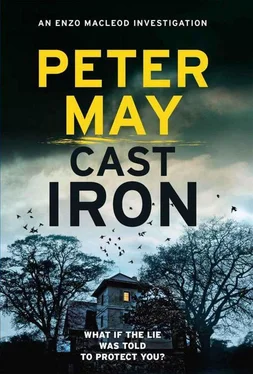‘Yes, and you’ve been so good at it so far.’ It was out of his mouth before he could stop himself, and he saw Hélène withdraw her hand, as if from an electric shock. Regret immediately rushed in to fill all his empty places. He reached out and took her hand. ‘I’m sorry, Hélène. That was unfair.’ But he had hurt her, and hurt is something that is very hard to take back.
She pulled her hand away and rounded her desk. ‘I should probably be getting home.’
Dominique felt the hurt and tension that lay between them and tried to bridge the gap. ‘Speaking of DNA,’ she said, and delved into her bag to retrieve the small plastic container with the strands of Laurent’s hair that they had taken from his comb.
Enzo glanced at it and turned away. ‘This isn’t the time.’ He reached for the door.
But Hélène’s interest was piqued. ‘The time for what?’ She glanced at the hair sample and back at Enzo.
‘It doesn’t matter.’ He opened the door.
Dominique said, ‘There’s a question mark over the paternity of Enzo’s son, Laurent. We thought, maybe...’
Enzo avoided Hélène’s eye, and tried to ignore the curiosity in the look she gave him. ‘Like I said. This isn’t the time.’
Hélène took the container from Dominique, but kept her eyes on Enzo. ‘Well, since your DNA will still be in our database... I’ll pull a few strings.’ She paused. ‘I’ll keep you up to date with any developments on Sophie.’ Another pause. ‘If you’ll do the same?’ She raised an eyebrow and cocked her head.
Handling both his regret and his embarrassment at the same time was difficult for Enzo, and all he managed was a nod.
Anne-Laure Blanc lived on the second floor of a seventies apartment block in the Bordeaux banlieue of Pessac, made infamous by La Cité Frugès, a self-contained housing scheme designed and built for workers in the 1920s by the Swiss-born architect Corbusier. Her one-bed apartment overlooked some of the concrete cubes intended by Corbusier’s experiment to solve a twentieth-century housing shortage. All brightly painted now in orange and blue and green and red, and set in serried rows among trees shedding autumn leaves on empty streets.
In the two-and-a-half-hour drive from Cahors to Bordeaux, Enzo had briefed Dominique fully on the events of the past week and every tiny detail of his investigation into the murder of Lucie Martin. His eyes were stinging from lack of sleep, although he supposed he must have drifted off sometime shortly before the alarm brought him crashing back into reality and the sickening recollection of Sophie’s abduction. Coffee had turned to acid in his stomach, and his mouth was dry and suffused with a bad taste that wouldn’t go away.
Anne-Laure was happy enough to invite them into her tiny apartment, and although she had filled it with bright paintings and photographs, and china ornaments of puppies and pixies, she had the demeanour of someone entirely consumed by loneliness. Even had they been the bearers of bad news, Enzo thought, she would still have greeted them with a smile, an offer of coffee and an invitation to sit on her best settee.
She had put on weight, Enzo imagined, since the days when she and Régis had married, and her red-dyed hair seemed sparse, thinning perhaps with an early onset of the menopause. She wore blue jog-pants that fitted where they touched, and a pink hoodie that looked like it might have been purchased before the weight had begun to accumulate.
The apartment was clean enough, but made smaller somehow by cheap furniture that was much too big for it. An electric fire was switched off and the room was cold. Enzo wondered if it was an attempt to save money. A woman who was at home mid-morning was unlikely to have a job, and he thought she was probably on benefits.
‘I still go and see him sometimes,’ she said. ‘There’s no hard feelings. We had our time. It was short, and it passed. But he’s still a lovely man.’
Enzo and Dominique exchanged fleeting glances. It seemed an odd way to describe a triple murderer. She went off to retrieve a photo album from an ugly 1960s sideboard, and squeezed on to the settee between them to open it up. ‘I should look at these more often. Everything’s digital now, and nobody keeps photo albums any more. Which is a shame, because they are lovely to look back on.’ Everything, it seemed, in Anne-Laure’s life was ‘lovely’.
There were photographs taken in a bar somewhere of Régis and Anne-Laure raising glasses towards the camera. Both of them almost unrecognisable. Impossibly young, brimming with life and laughter, moments trapped in time and captured in the virulent reds and greens and blues of cheap 1980s film stock. Like the painted concrete blocks outside her window.
She flicked through the pages faster than they could take them in. Girls with the superficial glamour of the street-corner hooker, dyed blond hair and unthinkably short skirts. Men with broken-veined faces and glassy eyes leering at the lens. And then she stopped at a photograph taken in a park somewhere, sunlight dappling grass through summer leaves. She and Régis were seated on a travelling rug spread out on the lawn, a picnic hamper between them and a baby held up by Régis above his crossed legs. Both he and Anne-Laure were burned out in places by patches of sunlight, but their happiness shone through, and there was such pride in Régis’s smile that Enzo began to regard him as almost human.
‘Happiest days of my life,’ Anne-Laure said. Enzo glanced at her and saw that she was transported back to that time, a radiance in her eyes and her smile at the recollection of a life long gone. ‘Being pregnant was the best feeling ever. Like it’s what I had been born for.’ Then a darkness crossed her face. ‘Though I only ever had the one.’
Dominique said, ‘Why did you leave him?’
She laughed, as if there were something funny in the question. ‘Oh, Régis was never a one-girl man. I suppose I always knew that. But it wasn’t until he went inside that I realised there was no future for us. If I wanted a life of my own, a real life, it wasn’t going to be with Régis.’ Her smile was rueful and filled with irony. ‘And look where I ended up.’
Enzo said, ‘What did you know about Lucie Martin?’
She frowned. ‘Lucie...?’ Then recollection dawned. ‘Oh, that girl who was murdered over in Duras.’ She shook her head. ‘That wasn’t him. No doubt he had a thing for her. But that was just Régis. He’d never have hurt the girl.’ She turned a look on them that was so honest and open it was almost startling in its innocence, and Enzo wondered if it was the innocence in Anne-Laure that had attracted Régis, just as it was in Lucie. She said, ‘I never stopped loving him, I suppose. There was violence in him, but it was never directed at me. Or any other woman, as far as I knew. He always treated his girls well. They liked him. And that’s rare for a man in his line of work.’
‘Still,’ Dominique said, ‘he murdered three women.’
Anne-Laure’s smile faded and became fixed. ‘They say that, yes.’
‘He’s never denied it.’
‘No, he hasn’t. But it doesn’t make him a bad person.’
She stood up, a little huffily, closing her photo album and returning it to its place in the sideboard where it would reside unopened for who knew how many more years.
‘But don’t take my word for it. Ask any of his girls. They all loved him, you know. Go and see Lulu. She’ll tell you all about Régis. Still on the game, even after all these years. Past her sell-by, you might say. But, then, some men seem to like that kind of thing.’
‘Where would we find Lulu?’ Enzo asked.
‘I don’t know where she lives. But she still plies her trade on the Quai Deschamps,’ Ann-Laure said. ‘Any night after dark. Just ask one of the girls. Can I get you another coffee?’
Читать дальше












